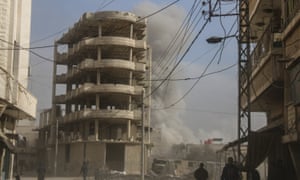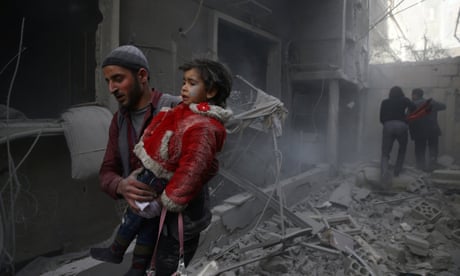
'Residents of the besieged Syrian enclave of eastern Ghouta have endured a fourth day of relentless bombardment by the government of Bashar al-Assad, a campaign that has so far killed more than 200 people and left a ceasefire deal that lasted months in tatters.
The bombardment continued despite international pleas for a countrywide ceasefire to alleviate “extreme” suffering in Syria, where the violence has been renewed after failed peace talks earlier this month.
“Ghouta is drowning in blood,” said a doctor in Arbeen, one of the towns in the region in which 100 people were wounded and at least 14 killed, including a rescue worker and several children.
“There is no safe place in Ghouta,” said Raed Srewel, a journalist based in Douma, another town in the area. “You can describe it with this saying we have: “On top of death, the graves are too small.”
59 civilians, including 15 children, have been killed on Thursday alone in eastern Ghouta, an enclave that has been under siege for years, endured a devastating sarin gas attack in 2013 and was once the bread basket of the nearby capital, Damascus.
The killings capped three days of shelling and bombardment after a national dialogue conference brokered by Russia failed to produce a breakthrough in peace talks. The violence, which continued in other parts of Syria as well, marked the effective end of a de-escalation agreement brokered by Moscow, Ankara and Tehran to reduce violence around the country and pave the way for peace talks.
That deal has unravelled with a broad government offensive in Idlib province in Syria’s north-west and eastern Ghouta, two of the last major strongholds of the opposition fighting Assad.
The offensive in Idlib has already displaced more than 300,000 people by UN estimates, numbers that have risen in the last few days. Many have sought refuge near the Turkish border, threatening a new influx of refugees.
In eastern Ghouta, rescue workers spent much of the day searching through the rubble of buildings that had collapsed under the airstrikes. They said they had tracked at least 76 airstrikes on Tuesday and Wednesday alone in the region.
“It has become a city of ghosts, and if you walk in it, it is filled with the smell of death and blood,” Srewel said, describing his hometown of Douma. “The planes are always in the skies of Ghouta, the markets and homes are being bombed, there are martyrs and wounded, and God is our only solace.”
Earlier this week the UN commission of inquiry, tasked with investigating war crimes and crimes against humanity in Syria, condemned the upsurge of violence in Idlib and Ghouta, saying they “make a mockery” of the de-escalation agreement.
“What is happening in eastern Ghouta is not simply a humanitarian crisis because aid is denied. These sieges involve the international crimes of indiscriminate bombardment and deliberate starvation of the civilian population,” said Paulo Pinheiro, the chair of the commission.
Russia dismissed calls for a month-long humanitarian ceasefire as the UN Security Council met to discuss the worsening humanitarian crisis. “That is not realistic,” said Russia’s UN envoy, Vassily Nebenzia. “We would like to see a ceasefire, the end of the war, but the terrorists, I am not sure, are in agreement.”
France’s ambassador to the UN, François Delattre, called for unhindered access for aid agencies. “Eastern Ghouta is experiencing a Middle Ages-style siege. That is totally unacceptable,” he said.
Syrian government forces also clashed with US forces in the eastern province of Deir ez-Zor, the first time such a large-scale confrontation has occurred on Syrian land.
An official with the US-led coalition against Islamic State told Reuters it had repelled a coordinated assault by pro-regime militias on a base in the region, a battle that Syrian state media appeared to confirm with a news bulletin that accused the coalition of killing dozens of militia fighters.
The official said no US troops had been killed or wounded in the attack, which was carried out by about 500 fighters, but one Syrian fighter allied with the coalition was wounded. More than a hundred pro-regime fighters were killed.'

The killings capped three days of shelling and bombardment after a national dialogue conference brokered by Russia failed to produce a breakthrough in peace talks. The violence, which continued in other parts of Syria as well, marked the effective end of a de-escalation agreement brokered by Moscow, Ankara and Tehran to reduce violence around the country and pave the way for peace talks.
That deal has unravelled with a broad government offensive in Idlib province in Syria’s north-west and eastern Ghouta, two of the last major strongholds of the opposition fighting Assad.
The offensive in Idlib has already displaced more than 300,000 people by UN estimates, numbers that have risen in the last few days. Many have sought refuge near the Turkish border, threatening a new influx of refugees.
In eastern Ghouta, rescue workers spent much of the day searching through the rubble of buildings that had collapsed under the airstrikes. They said they had tracked at least 76 airstrikes on Tuesday and Wednesday alone in the region.
“It has become a city of ghosts, and if you walk in it, it is filled with the smell of death and blood,” Srewel said, describing his hometown of Douma. “The planes are always in the skies of Ghouta, the markets and homes are being bombed, there are martyrs and wounded, and God is our only solace.”
Earlier this week the UN commission of inquiry, tasked with investigating war crimes and crimes against humanity in Syria, condemned the upsurge of violence in Idlib and Ghouta, saying they “make a mockery” of the de-escalation agreement.
“What is happening in eastern Ghouta is not simply a humanitarian crisis because aid is denied. These sieges involve the international crimes of indiscriminate bombardment and deliberate starvation of the civilian population,” said Paulo Pinheiro, the chair of the commission.
Russia dismissed calls for a month-long humanitarian ceasefire as the UN Security Council met to discuss the worsening humanitarian crisis. “That is not realistic,” said Russia’s UN envoy, Vassily Nebenzia. “We would like to see a ceasefire, the end of the war, but the terrorists, I am not sure, are in agreement.”
France’s ambassador to the UN, François Delattre, called for unhindered access for aid agencies. “Eastern Ghouta is experiencing a Middle Ages-style siege. That is totally unacceptable,” he said.
Syrian government forces also clashed with US forces in the eastern province of Deir ez-Zor, the first time such a large-scale confrontation has occurred on Syrian land.
An official with the US-led coalition against Islamic State told Reuters it had repelled a coordinated assault by pro-regime militias on a base in the region, a battle that Syrian state media appeared to confirm with a news bulletin that accused the coalition of killing dozens of militia fighters.
The official said no US troops had been killed or wounded in the attack, which was carried out by about 500 fighters, but one Syrian fighter allied with the coalition was wounded. More than a hundred pro-regime fighters were killed.'

0 Response to "East Ghouta ‘drowning in blood’ after third day of bombing"
Post a Comment